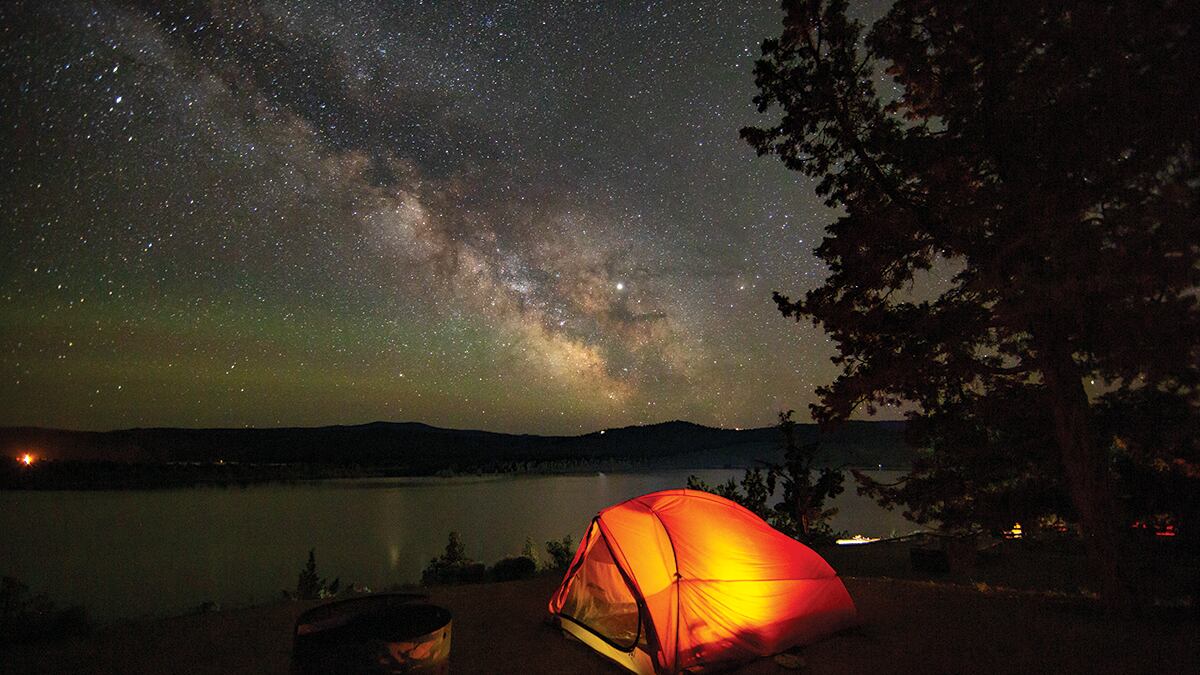Next time you’re getting down, look up.
Amid a global pandemic, racial and environmental reckonings, and ongoing political divisions, gazing at the heavens and contemplating the fact that everyone—yes, even your least-favorite ex-president, is just a speck of stardust—may be the ticket to the Existential Express. So when Portland’s skies are a cheerless shade of slate, the clear expanse above Central Oregon is ready for your celestial meanderings.
Dark-Sky Locations
The first tip for stargazing, says Grant Tandy, observatory manager at Worthy Brewing, is to go where no one else is.
“Not a lot of people realize that Bend is close to the largest section of dark sky in the United States,” he explains. “If you look at a light pollution map, southeastern Oregon—like the Alvord Desert—is the darkest you could get.” Even 20 minutes outside Bend is ideal, Tandy adds.
In Central Oregon, two locales are bona fide dark-sky spots, earning designations from the International Dark-Sky Association, the leading organization combating light pollution worldwide. Sunriver became Oregon’s first designated Dark Sky Place in 2020. Simply looking up at night is one way to take in the bounty, but Sunriver is also home to the Oregon Observatory, the largest observatory in the country open to the public. It operates year-round, and reservations are required for nighttime visits.
Recently added to the Dark Sky roster is Prineville Reservoir State Park, which became Oregon’s first International Dark Sky Park in May. Camping along the shore practically ensures you’ll be lulled to sleep by a beautiful view of the Milky Way.
Stargaze Then Soak
Thirty minutes east of Bend, the well-appointed resort community of Brasada Ranch partners with the Oregon Observatory to offer stargazing experiences several nights a week, largely during the spring and summer, but some winter sessions are available. Observatory staff sets up telescopes outside Brasada’s Range Restaurant & Bar, inviting guests to take a look at star clusters, nebulas, galaxies and more. Those who want more time with the experts can book individualized appointments, like catered stargazing dinners or campouts.
“A lot of people really end up not even appreciating the telescope as much as they do pointing out the constellations,” says Paul Poncy, astronomy interpreter for Oregon Observatory.
After getting some pro tips at Brasada, guests can head back to their cabins for a soak. Each cabin comes with its own hot tub—ensuring yet another date with the heavens.
Toasts and Telescopes
Drinking a beer or three may invite celestial contemplation all on its own, but at Bend’s Worthy Brewing, stargazing is part of the brewery’s DNA. Worthy Garden Club’s Hopservatory contains a 16-inch research-grade reflector telescope and a 4-inch refractor telescope as part of its focus on environmental stewardship. While technically in Bend, where astronomical population growth means growing light pollution, observatory manager Tandy still sees value in having an observatory here.
“We’re not going to be able to image objects like you would at Pine Mountain Observatory,” the University of Oregon’s physics research observatory 34 miles southeast of Bend, he says, “but we’re reaching people where they’re at.”
